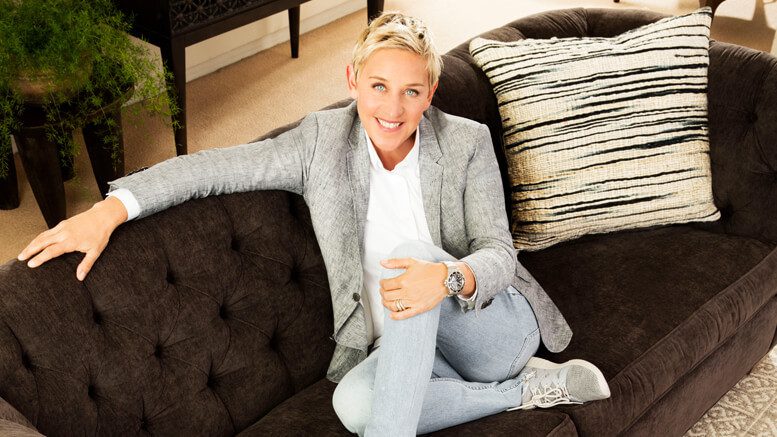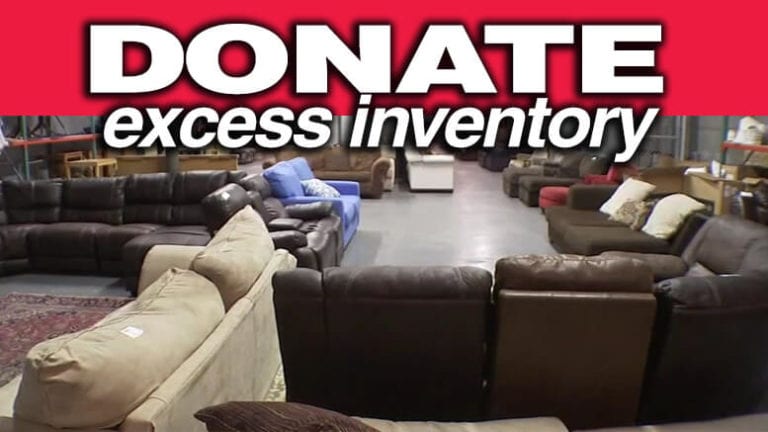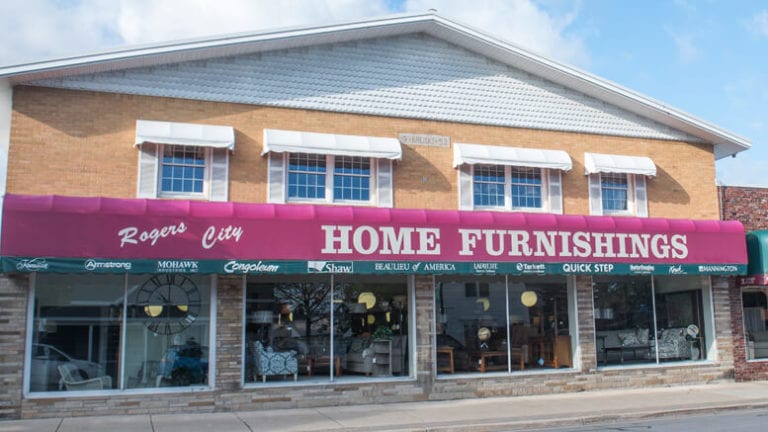What do luxury consumers want in upholstery? It helps if you have a name behind it. Pull up a chair.
Comfort, customization and cachet. These are the watch-words in better-end upholstered furniture with any number of runway-inspired looks turning heads at the Fall 2017 High Point Market.
Trend-watchers strolling through InterHall last month found lush leathers used to create fashion-forward fringe, ruffling and textured surfaces at Nathan Anthony. “We were inspired by the ornate fabrics, puffy sleeves and fringe seen on the fashion runways in Paris this year,” said Tina Nicole, co-owner and lead designer.
Down the hall from Nathan Anthony, high fashion was on the minds of Mark Badgley and James Mischka as well, with buyers across market flocking to see new collections inspired by the designers’ red carpet apparel, and arguably, to rub elbows with the creatives behind a glamorous brand known for dressing the likes of Madonna, Julia Roberts, Helen Mirren and other celebrities.

offering by Atlanta retailer Bungalow Classic.
While celebrity licenses abound in High Point and on the floors of top 100 retailers across the country, fashion and interior designers have long dominated the landscape at the better end of the business, along with collections inspired by stately homes, museums and shelter publications. Yet, even as new names and brands appear on the upholstery scene, the term “licensing,”—and the question of whether a designer’s name helps to sell product today—continues to spark many a debate.
“A designer’s name helps to bring recognition to a piece and gives it roots,” says industry trend forecaster Ellen Gefen. “Many times it attaches a great story to the product, and the name provides consumers with a sense of confidence. Particularly at the better end of the market, an interior designer’s label infers that there is an opportunity to change the fabric or the size of a sofa or chair, because interior designers typically create true custom pieces for their individual clients.”
As designer David Phoenix, who launched a collection with Hickory Chair one year ago, notes, “Designers think differently. And that helps retailers add a layer of sophistication to their floors.”
Sometimes too, as is the case with Atlanta’s Bungalow Classic at Highland House, retailers themselves are tapped to create licensed collections. Bungalow’s Courtney Tiliniski recalls when Nathan Copeland, president of Highland House, approached her about designing a collection. “It was super organic, no agents, no shopping around for a manufacturer,” Tillinski says. “We had always done design and dabbled in private label pieces for our own store with various vendors that were never sold to other stores. We simply designed the pieces as exclusives for our store in Atlanta and we developed a nice following.”
Today the retailer’s pieces for Highland House are alongside Suzanne Kasler’s collection for Hickory Chair on Bungalow’s floor. No piece is labeled with anything other than the store’s name. “We don’t differentiate things in that way,” says Tilinski. “We believe people still come to our store for the feel and look, which is a pretty solid mix of very classic designs with a lot of layers. What matters to us is that they love the chair. And then if we tell them, ‘Well this is Suzanne Kasler, it’s a highlight. They think, ‘Well of course I love it because Suzanne is fabulous.’”
The Name Game
Indeed, when discussion turns to the industry’s most successful licensed collections, Hickory Chair’s Suzanne Kasler is often held up by many better-end retailers as an example of a licensed collection, now in its 10th year, at its best.
“Her collection for Hickory Chair is just very tasteful,” says Don Easterling, interior designer and buyer for Mathews Furniture+Design in Atlanta. “The scale is right and the designs are timeless. There are currently a lot of trendy contemporary things in the marketplace, but to me, Suzanne’s designs will always be in style whether you have a traditional or transitional space, or even a contemporary, high-rise condo that’s ultra-modern.”
“Consumers are much smarter today and they have the internet at their fingertips,” says retailer Leslie Raguse, the force behind five-store, Los Angeles-based West Coast Living Thomasville, where licensed collections run the gamut from Thomasville’s Hemingway to the relatively new Ellen DeGeneres, Thomas O’Brien and Joanna Gaines’ Magnolia Home lines. “If you plug in a name, and you can see it in on everything from furniture to food, I don’t know how believable it is that the name had much of anything to do with creating the collection.”
Jonathan Bass, chief executive officer at Badgely Mischka Home, calls it “brand-slapping and brand-slapping doesn’t get you the sale, because when the brand is long forgotten, it’s the quality of the product that will remain,” he says. “In upholstery, I believe the only thing a label does is invite you to sit on the furniture. To be relevant to a consumer, it’s not just about a name. It’s got to be a whole lifestyle.”

Industry veteran Ed Tashijan, who’s eponymous consulting firm worked with Fine Furniture & Design to bring the Verandah Collection to market, agrees. “In a world where furniture increasingly looks more alike, and supply outstrips demand, there’s a need to differentiate your brand, and it happens in more than just the product,” he says. “It also has to happen with the pricing and the positioning, and the manufacturer has to work with the retailer today in a way that they are not just selling in product, but that they are selling it through to the end customer. So, when you license a brand, not only are you licensing the equity that is built into that brand name, which presumably is greater or different than yours so that it has a synergistic effect, you’re also licensing access to the customer base that already has a positive association with that brand.”
In the case of Verandah, the customer base includes half a million subscribers to the magazine. “You are targeting people who have already defined themselves psycho-graphically as having an interest in their home and home furnishings and who place a high priority on a sense of style,” Tashijan say.

Bass says that at the better-end of upholstery, “most American consumers cannot put together a room without design help. They cannot go online and say, ‘I want this chair there, and that sofa there.’ They need a designer to help them pull it together. And in high-end upholstery, she doesn’t want made goods. She wants special order.”
Ericka Saurit, director of brand marketing at Verellen, agrees. “The luxury consumer wants customization,” says Saurit. “They want to be able to have something that no-one else has, and they want to be able to put their own style, their own mark, their own personality on a piece. In upholstered furniture, that can mean anything from the size—perhaps they are very tall or they have a smaller frame and they want a piece to really conform to them—to obviously, pattern and fabric.” And, while Verellen has never produced a licensed collection, Saurit says she believes that designers’ names do open doors.
Indeed, although Kasler is well-known as an Atlanta native, retailer Meredith O’Donnell, reports that Kasler’s name is just as well known to the affluent customers frequenting her Houston high-end furniture store, where the offerings include many of the aforementioned designer collections, along with Thomas O’Brien (Century) and those based on great homes like Althorp (Theodore Alexander). For her part, O’Donnell thinks that a licensed collection has a better chance of winning at retail when an actual interior designer is involved in its conception.
“Having a really personable designer behind the collection is a big help,” says O’Donnell, “someone who is willing to not only shake hands with buyers at Market, but who is also willing to go out on the road and meet consumers in the stores. Mark Sykes at Henredon was here recently and he met every single person in the store and talked with them. That’s what people want, and young designers come to events like that for exposure. We actually built our store with entertaining 80 to 150 people at a time in mind—people who are really interested in coming to see a designer or having a book signed—and that’s our favorite kind of party to have.”
“On the upscale side, consumers like authenticity and the lunch-and-learn scenario,” comments furniture designer Bruce Hirschhaut. “Whether it’s someone from Scalamandre giving a presentation on the history of certain fabrics and tying it together with great frames or Thomas Pheasant talking about his designs for Baker, it creates a lot of attention and retailers love it because it draws certain people into the store.”
What It Takes

Raguse says the exclusivity of a branded collection has its merits with consumers. “As a buyer, the reason I’m attracted to a branded collection is that unlike a lot of other industries, we just don’t have a lot of brand awareness,” Raguse says. “People know Mercedes and BMW, but if you ask most consumers to name their top five favorite brands of furniture, they are more likely to name a retailer, like Restoration Hardware or Ikea. A good licensed collection evokes a certain sense of lifestyle that the consumer can relate to. They might not know Lexington Furniture, but if you say I have Tommy Bahama in my house, it brings to mind a relaxed, sort of coastal feeling.”
Four things attract Raguse to invest in a licensed collection for her stores. “The first is that the product has to be good, and if it’s not, it won’t sell. We’ve had licensed collections fail miserably on our floor and at the end of the day it was because the product styling just didn’t resonate with the consumer. The second thing is value, because licensing a name or brand adds a percentage to the price of the furniture, and I think consumers today recognize that. That’s one of the things that we love about the Ellen DeGeneres Collection. She wanted to make a quality product that represented her personal style and she was super-involved. It was really key to her that it had to be affordable.
“The third thing, for me, is freedom in advertising, and this is a biggie,” Ragusa notes. “I’ve dealt with licensed collections that were so restrictive you had to send an ad to be approved by the manufacturer before it could run and it would take them months to approve it. By that time, I’d say, ‘I’m just not going to advertise this stuff because there are a lot of other collections that make it far easier for me to do so.’
“The last thing,” the executive says, “is distribution. I don’t want to buy merchandise that’s sold everywhere because it becomes less special, and a commodity.”











